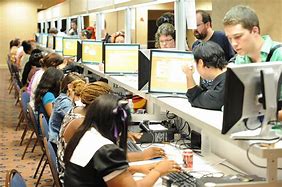Top 20 Librarian Fresher Interview Questions
Table of Contents
Top 20 Librarian Fresher Interview Questions
Can you tell us about your background and why you’re interested in becoming a librarian?
Example – “I’ve always enjoyed reading and recognized the value of information that is properly organized. I pursued a degree in Library Science because I believe in the power of libraries to facilitate learning and access to knowledge. This role aligns with my interests and values.”
What do you think are the essential qualities a librarian should possess?
Example – “A successful lifelong learner must possess excellent organizational abilities, strong communication skills, attention to detail, a passion for serving others, adaptability to new technologies, and a commitment to lifelong learning.”
How would you respond if a library user was being noisy or disruptive?
Example -“I would approach the patron politely and respectfully, asking them to lower their voice or cease disruptive behavior. If the issue persists, I would involve the library’s security or management and follow established policies for handling such situations.”
What experience do you have with library cataloging and classification systems?
Example – “During my coursework, I learned about various cataloging and classification systems, including Dewey Decimal, Library of Congress, and MARC. I also had practical experience in cataloging books, which involved assigning appropriate call numbers and subject headings.”
How do you stay updated with the latest trends and technologies in library science?
Example – “I stay updated by reading professional journals, attending library conferences, and participating in online forums and webinars. I am also a member of library associations that provide valuable resources and networking opportunities.”
Can you describe your experience with library management software and integrated library systems (ILS)?
Example – “While in school, I had hands-on experience with popular ILS software like Koha and Evergreen. I have also used library management software for tasks such as circulation management, cataloging, and patron records.”
How would you promote library programs and services to the community and encourage library usage?
Example – “I would use social media, community events, and collaborations with nearby schools and organizations to promote library programs and services. I’d also create engaging displays and collaborate with colleagues to develop innovative programs.”
Describe a time when you had to handle a challenging reference question? How did you approach it?
Example – “In a previous internship, a patron had a complex research question. I started by listening carefully, then used online databases, reference materials, and consulted with colleagues to find the necessary information. I presented the information clearly and ensured the patron’s needs were met.”
How do you deal with censorship concerns and requests to remove books from the library collection?
Example – “I believe in intellectual freedom and adhering to library policies. If there is a request to remove a book, I would follow the library’s established procedures, involving the library board if necessary, and provide a balanced and fair assessment.”
What strategies would you use to create an inclusive and welcoming library environment for all patrons?
Example – “To further increase inclusivity, I would ensure that the collections are diverse, train the staff to be culturally competent, provide accessible services, and actively gather customer feedback.”
How do you handle the preservation and conservation of library materials, especially rare or fragile items?
Example – “I would follow to accepted preservation practices, such as proper handling, climate control, and archival storage. For rare items, I would consult with experts and consider digitization for accessibility while preserving the original.”
Can you explain the concept of intellectual property and copyright issues in a library context?
Example – “Intellectual property refers to the legal rights of creators. In a library, it’s essential to respect copyright laws by obtaining proper permissions or licenses for materials, educating patrons on fair use, and maintaining copyright compliance.”
How do you handle confidentiality and privacy concerns related to patron records and information requests?
Example – “I would without any question abide by the library’s privacy policies, ensuring the confidentiality of customer information. I would only disclose information as required by law and with the patron’s consent.”
Tell us about your experience with library programming for different age groups, such as children, teenagers, and adults?
Example -“During my internship, I assisted in planning and executing programs for all age groups. These included storytimes for children, book clubs for teenagers, and workshops for adults. I understand the importance of tailoring programs to specific age groups.”
How do you handle a situation where a patron cannot find a book they are looking for in the library’s collection?
Example – “I would start by helping the customer perform an in depth search. If the item is not in the collection, I would offer to place an interlibrary loan request or suggest alternative resources to meet their needs.”
Can you discuss your experience with library budgeting and resource allocation?
Example – “While in school, I worked on library budgeting projects, helping to allocate funds for materials, technology upgrades, and programs. I understand the importance of balancing resources to meet the needs of patrons.”
How do you handle technology-related challenges, such as assisting patrons with computer problems or troubleshooting library equipment?
Example – “I would provide extensive troubleshooting and amiable support while forwarding more complex problems to the library’s IT support for assistance. Offering technology workshops and guides can also empower patrons to use library resources independently.”
Describe a situation where you had to work collaboratively with colleagues or volunteers to achieve a common goal?
Example – “A summer reading program was something I worked on with colleagues in my former workplace. We planned and executed various events, combining our skills and ideas to create a successful program that engaged the community.”
How do you handle a heavy workload or multiple tasks with competing priorities in a library setting?
Example – “I would prioritize tasks based on urgency and importance, create a to-do list, and use time management techniques to efficiently complete them. I believe in staying organized and seeking assistance when needed.”
Where do you see yourself in your library career in the next 5 years?
Example – “In the next 5 years, I envision myself as a skilled librarian who has expanded their expertise in a specialized area, such as digital librarianship or academic libraries. I also hope to take on leadership roles within the library profession and contribute to the field’s growth and development.”




